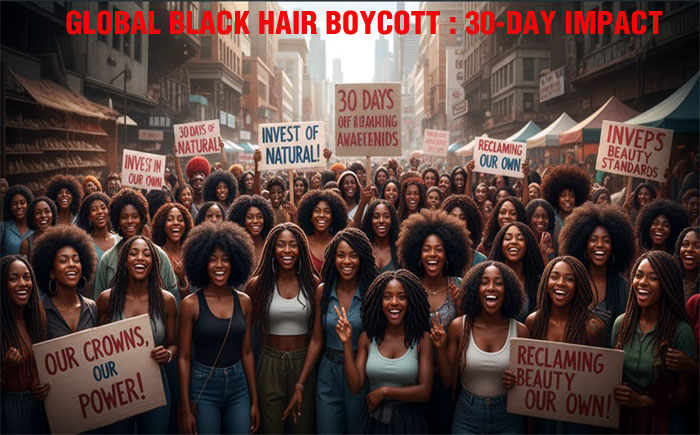
The Economic Sovereignty, Strategic Leverage, and the Legal Right to collective action, while retaining the core message of challenging historic power imbalances.
The persistent economic disparities and institutional frameworks governing global resource distribution are direct legacies of centuries of colonial and post-colonial exploitation in Africa, often maintained through unequal trade relationships and economic policy influence originating in North America and Western Europe.
This enduring dependence raises a critical question regarding economic self-determination and the right of the African diaspora to challenge these established narratives.
It is time to strategically recalibrate this global narrative through decisive, non-violent economic action. We propose initiating a global movement centered on economic leverage and consumer power, beginning with a focused, time-bound Global Black Hair Product Boycott.
1. Legal Basis for Boycotts (Collective Action): Collective consumer boycotts are a widely recognized form of protected economic expression and civil protest in most democratic nations. This action falls firmly within the rights to free assembly and free speech, functioning as a targeted withdrawal of consumer dollars to challenge specific industry practices and corporate dependencies.
2. Economic Sovereignty and Value Capture: The global Black hair care industry is valued in the billions, yet a significant proportion of the profits flow out of Black communities and Africa, benefiting multinational corporations whose historical practices and supply chains may lack full ethical or equitable accountability. This initiative re-frames the action as a necessary step toward repatriating economic value and forcing investment into locally owned, Black-led businesses across the continent and diaspora.
3. Challenging Institutional Dependency: The primary goal shifts from merely highlighting historical wrongs to creating measurable market disruption. This forces policymakers and corporate leaders in dominant global economies (particularly the US, UK, and France) to acknowledge the collective economic power of the diaspora and address the systemic economic architectures that perpetuate dependency.
We are not merely protesting the past; we are asserting economic agency in the present to secure a more equitable future. This is a demand for partnership based on mutual respect and fair valuation, not continued subservience.
The success of a strategic boycott rests on clear targets. To strengthen this argument, would you like to explore identifying the specific economic sectors or major corporations that would be most impacted by a 30-day global Black hair product boycott, and outline the measurable demands that would follow the action?
Here’s a day-by-day scenario of what could happen if all Black women worldwide stopped buying hair products for 30 days, based on a blend of economic projections, cultural dynamics, and real-world reactions already seen in grassroots movements:
- Beauty supply stores in Black neighborhoods go eerily quiet.
- Major importers in China, India, and South Korea report a sudden drop in orders.
- Stylists and braiders begin rescheduling appointments or pivoting to natural hair services.
- Social media buzzes: TikTok and Instagram fill with posts like “I’m in. Are you?”
- Natural hair pride begins trending, with women sharing DIY recipes and protective style tutorials.
- Wholesalers raise alarms as warehouses pile up with unsold synthetic hair and chemical products.
- Beauty conglomerates (mostly non-Black-owned) call emergency meetings.
- Influencers start viral challenges like “30 Days No Fake Hair,” gaining millions of views.
- Manufacturers begin offering bulk discounts and flash sales to move inventory.
- Black-owned brands see a spike in engagement as women look for alternatives.

- Conversations shift: “Who taught us our natural hair wasn’t enough?”
- African and Caribbean media pick up the story, framing it as a diaspora-wide movement.
- Celebrities and stylists weigh in—some applaud, others panic.
- Beauty supply store owners, many of whom are non-Black, begin lobbying or pleading for a return to “normal.”
- Natural hair events and pop-ups surge in popularity.
- Economists estimate billions in losses across the global hair extension and chemical relaxer industry.
- India and China, major exporters of synthetic hair, face pressure from distributors to dump or repurpose stock.
- Influencers are offered money to quietly break the boycott—some refuse publicly.
- Critics argue it’s “bad for stylists,” but many stylists respond: “We adapt. We’ve always adapted.”
- Academics and journalists begin analyzing the boycott as a case study in economic protest.
- Black women realize: the wig and weave market was built on them, not for them.
- Legacy beauty brands scramble to show inclusion—again, too late.
- Entrepreneurs begin pitching Black-owned synthetic hair alternatives and natural hair tech.
- Afro-centric media runs specials on beauty colonization and hair politics.
- Financial analysts declare: “Black women just created a luxury recession.”
- The silence breaks, but the mindset has shifted.
- Natural haircare businesses, salons, and educators boom.
- Buying decisions become politicized—women re-enter the market only on their terms.
- Black women return not just as consumers, but as decision-makers, producers, and power brokers.
- The question becomes: Why go back to the old way at all?
- Black-owned brands gain long-term market share.
- Mainstream brands are forced to reformulate, repackage, and rebrand—with real inclusion this time.
- Conversations about health risks (e.g., relaxers linked to cancer) gain mainstream traction.
- A global reckoning begins about who profits from Black beauty—and who should.
This scenario isn’t just hypothetical it’s inspired by real momentum. A 30-day boycott was already planned for September 2025, with thousands of Black women committing to only support Black-owned brands and embrace natural hair care alternatives.
This has been The Red Hot Report from Pepper-Room. The news that bears it all.
www.pepperroom.com.ng #pepperroomnews #pepperroomng #pepperroom
Lagos, Nigeria.
+234 913 161 4181
+234 802 586 9823
+234 803 961 8550
info@pepperroom.com.ng
© 2025 | 🌶️Pepper-Room - Everything Loud, Wild, and Worth Talking About. | All Rights Reserved.
Pepper-Room is not responsible for the content of external sites.